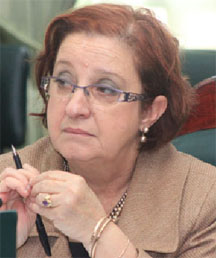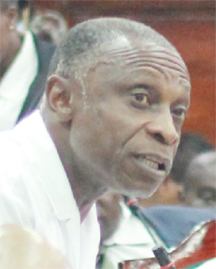However, A Partnership for National Unity (APNU) Member of Parliament Carl Greenidge supports the findings of the study, saying that government insists on behaving as though it has the majority when it does not and the executive must leave the National Assembly to function as the constitution envisages.
The study, released in April to the Speaker of the National Assembly said that despite reforms, the National Assembly continues to lack sufficient autonomy and resources. It said too that the tenor of debate continues to be shaped by political division.
The study was carried out in December 2012 by Robin James of the UK House of Commons and Dr David Ponet of the United Nations Children’s Fund (UNICEF) as part of an ongoing Parliamentary Support Project, signed in September 2011 between the Government of Guyana, UNDP and UNICEF.
The consultants focused on capacity, resourcing and political will, explaining that some of the capacity challenges reflect resource needs and structural impediments while others may be a function of political will. They found that the politics on display in the National Assembly occlude the development of capacity and said that in the longer term the Parliament should aim to achieve financial and organisational autonomy from the government.

“The first thing is that the report has not been discussed by the Parliamentary Management Com-mittee,” Teixeira told Stabroek News on Thursday. “Secondly, I have certain concerns about the report because the consultants seem to have got a number of their facts wrong,” she said.
“There are details that are wrong…if you have wrong facts you will come to wrong conclusions,” she said. “They do have wrong facts and to me they make certain conclusions that are wrong,” said Teixeira. But I am waiting for my opportunity to discuss it. I don’t know how you got the report that the Parliament has not looked at yet,” she said.
“The Committee System functions, I don’t understand your question about independence,” she said. “If I were to answer it now as opposed to the Ninth Parliament I would say that now you have the opposition controlling 90-odd per cent of the committees and basically if they don’t get their way they vote through and that is a problem of independence of the Parliament,” Teixeira said. “It means that the elected authority – the government’s voice – is being muzzled.”
According to her, the government, when it had the majority in the House, never behaved that way. “This time there are more votes in committees than before,” she said.
“It was never envisaged in that way when the expanded committee system was created. It was meant to create space for greater sharing between government and opposition in relation to oversight of government and in special select committees to look at bills and other issues of importance. It was never seen that the committees are an attempt to reach consensus and that’s how it was in the Ninth Parliament and the ones that started in the Eighth Parliament,” said Teixeira.
“We are on a trajectory of implementation… This is only a matter of seven years. I don’t think the parliamentary system per se needs to be changed. What needs to be changed is a political attitude that the Opposition seems to have right now that since they have the majority they can ramrod things through and that is the greater danger to the committee system in Guyana’s Parliament,” she said.
Teixeira said that Parliament is the legislative arm of the government and it is there to do law making and to deal with issues related to the society in general. “The committee system is new… it was set up in 2005 with the four – what were the constitutional committees and there were other committees that had been formed subsequently,” she said.
With a view to making the Parliament and other agencies more independent, the opposition brought before the House a number of bills and motions. These include two Fiscal Management and Accountability (Amendment) Bills meant to see to the independence of the judiciary, the service commissions and the Ethnic Relations Commission, as well as the Clerk of the National Assembly Bill to strengthen the office of the Clerk and to give that office the means to acquire staff as it deems necessary. There were also motions on the National Industrial and Commercial Investments Limited (NICIL) and on the constitutional agencies.

Speaking on the findings of the UNDP study, Greenidge said that the plight in which the Parliament finds itself was the subject of a long examination and report by Sir Michael Davies in 2005.
“We have a situation where the Parliament has to depend on the Executive to carry out activities. Yes it is true that the Parliament has monies allocated to it for paying for various services, but the amounts that are there are determined by the Minister of Finance and they are really not the subject of any meaningful discussion by the legislature,” he said.
According to Greenidge, the government has a peculiar interpretation of the standing orders and the statutes. “They believe that once they present something you have no right to change it, which is clearly absurd. That cannot be power-sharing, nor can it be a Westminster-type model,” he said. “You have to be able to discuss and modify what is presented in a manner that is consistent with the majority views in the House,” he said.
“When I compared the Parliament now with when I was a minister clearly the physical facilities have improved. The digitisation and the process of trying to ensure that the library works show that there have been improvements on the physical side. Maybe there are even some organisational improvements,” he said. “But what is very clear is that whilst you have a public commitment to making the committee system more effective, while the government would – while there are visiting Commonwealth Parliamentary Association (CPA) dignitaries – make reference to the issue of participation by all the parties in the process of decision making and so forth, the reality is really not quite so bright,” he said.
“The basic problem that we have is I think the political party in government has an ideology towards decision making that is radically different from the two on the other side,” he said. “The political party in office sees itself as entitled to doing all the things that a majority government can do, plus the things that are common in the east, that is Eastern Europe, where the Executive actually controls everything, including the operation of the legislature,” he said.
He said that while people speak about shared governance, the truth is within the legislature and its operations, it is supposed to be supreme in its law making. “The sharing of its law-making powers by the President in the enactment of bills is seen by the government as almost as though it is the President who is supposed to introduce and approve these laws. You arrange things so as to prevent the legislature from itself determining what takes place,” he said. “It seeks to ensure that no deliberation yields outcomes that they don’t want. Whenever that happens the President will use whatever is in his power to frustrate that, or the Attorney General will seek to use the courts – a weakened court system to either give him the time or so to confuse issues that he could go ahead as though the government is the majority in the Parliament,” said Greenidge.




